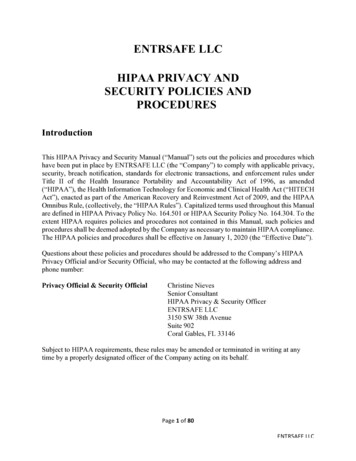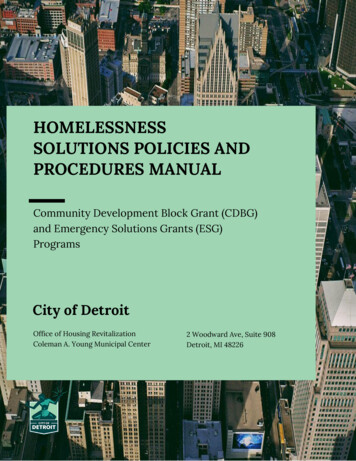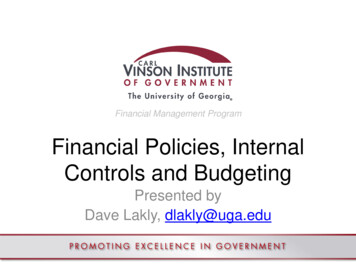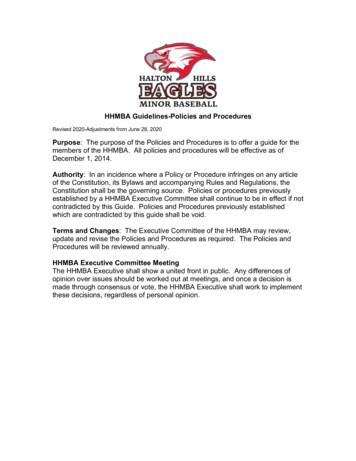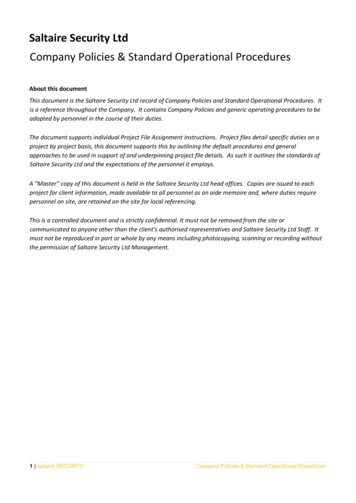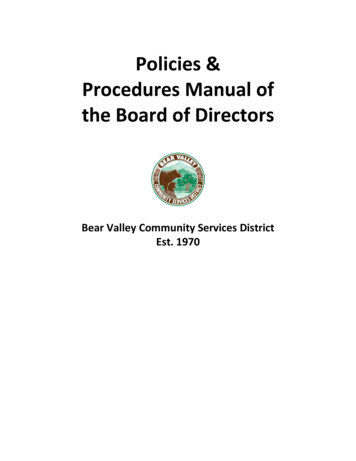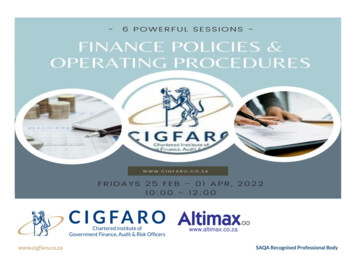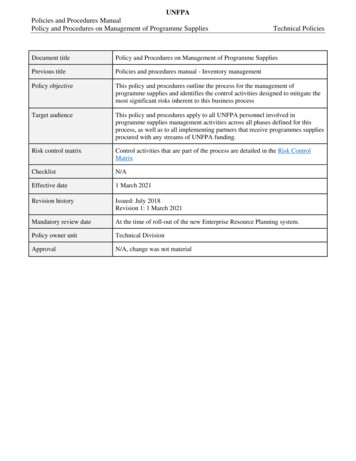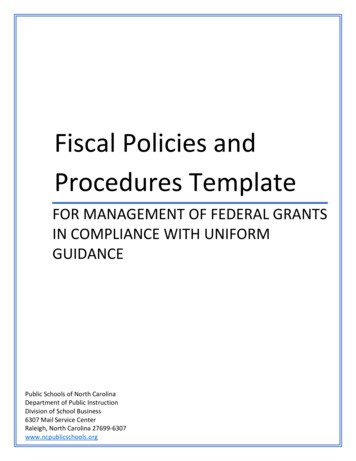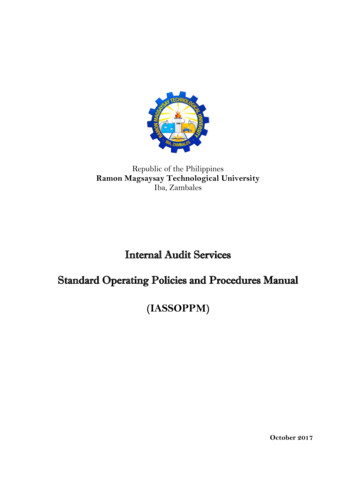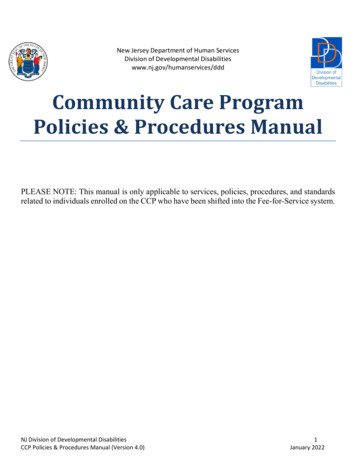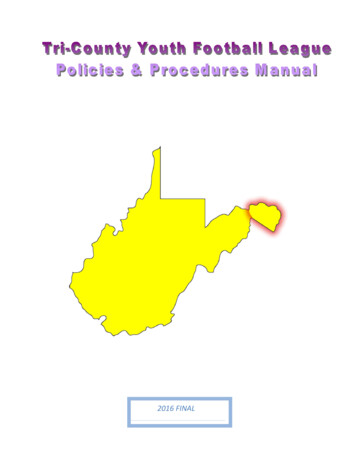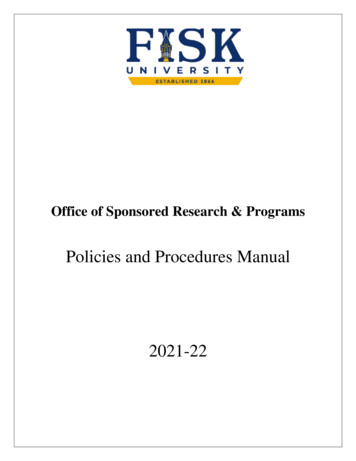
Transcription
Office of Sponsored Research & ProgramsPolicies and Procedures Manual2021-22
John D. Jones, PhDProvost & Vice President for Academic AffairsCravath Hall, Room 110jjones@fisk.edu(615) 329-8681Sajid Hussain, PhDDirector, Office of Sponsored Research & ProgramsCravath Hall, Room 110shussain@fisk.edu(615) 329-8524BriAnna Baber, PhDAssistant Director, Office of Sponsored Research & ProgramsTalley Brady, Room 207bbaber@fisk.edu(615) 329-86242
Table of Contents1.General Information . 72.Mission Statement. 73.Contact Information . 74.Organizational Structure . 85.Outcomes . 9Strategies to achieve Outcomes . 96.Overview of Services . 10Research Support . 10Proposal Development . 10Proposal Review . 10Funding Source References . 107.Incentives Program . 118.Pre-Proposal Development Activities . 12Proposal Submission Procedure and Post-Award Activities . 12Pre-Award Activities . 129.Proposal Development . 13Request for Proposals (RFP) . 13Concept Paper . 13Proposal Components . 13Cover Page . 13Abstract . 14Problem Statement/Needs Assessment . 14Literature Review/Bibliography . 14Objectives/Questions/Hypotheses. 15Preliminary Work. 15Methodology/Design. 15Evaluation . 16Results/Significance . 16Dissemination . 16Management Plan. 16Other Components . 16Budget Consideration. 17Personnel . 173
Academic Personnel. 17Fringe Benefits . 17Consultant Services . 18Subcontracts . 18Computer costs. 18Equipment . 18Materials and Supplies . 18Travel . 19Alterations and Renovations . 19Other Expenses . 19Indirect Costs . 20Cost Sharing (if required) . 20Trainee Costs . 2010.Post-Award Activities . 21Human Subjects, Laboratory Animals, Recombinant DNA, Hazardous Materials andRadioisotopes . 21Policy on Indirect Cost. 21Employment and Compensation on Research and Sponsored Program Activities . 21Federal and State Grant Expenditures. 21Transfer of Principal Investigator to another Institution. 2111.Purchasing and Accounting . 22Requisition . 22Purchase Order . 22Grants . 22Contracts . 2212.Compliance . 23Policies and Procedures . 2313.Publications Policy. 2314.Intellectual Property . 2315.Human Subjects in Research . 24IRB Committee . 24Procedures: . 2416.Copyright Policy . 2517.Subcontracting . 254
18.Conflict of Interest . 26Outside Interests. 26Other Potential Conflicts of Interest . 2719.Debarment and Suspension . 2720.Health and Safety . 2821.Programmatic Compliance/Technical Reports . 2822.Consultant Payments. 2923.Stipends . 3024.Impact of Release Time on Cost Sharing . 3025.Expenditure of Project Funds. 3026.Travel Reimbursement . 3127.Budget Transfers . 3128.Final Reports . 32Final Report of Expenditures . 32Technical Reports . 3229.Subcontracting Practices and Procedures . 33What Is a Subcontract? . 33Agreement . 33Authority of. 33Consistent with. 33Transfers a portion of the research or substantive effort . 33Submission of a Subcontractual Proposal . 33Responsibilities of Prime Awardee . 34Drafting and Negotiating Subcontracts . 35Securing Sponsor Approval . 35Rights and Responsibilities of Each Party . 35Standard Subcontract Clauses Include: . 35Post-Award Management of Subcontracts. 36Receiving a Subcontract . 36Administering Subcontracts . 36Modifications . 36Invoicing . 37Establishing Systems . 37Consistency . 375
Policy Statement . 38The Statement of Work . 39The Budget . 39Why Such Attention to Detail? . 3930.APPENDICES . 41APPENDIX A: Sign Off Sheet / Information . 42Appendix B: Proposal Submission Process Flow Chart . 44Appendix C: Award Process Flow Chart . 456
1.General InformationThe Fisk University Office of Sponsored Programs (OSP) is part of the Office of the Provost andserves as the major unit responsible for the development and promotion of the University's overallprogram of sponsored programs and sponsored research. OSP implements the establishedsponsored programs and research priorities, goals and policies as defined in the University's longrange strategic plan. OSP is responsible for assisting all facets of the University with the processof sponsored programs and research. It provides support for research and externally fundedprograms at the University. All proposals involving sponsored programs and research arereviewed and approved by OSP prior to final submission to the external funding agencies.Related information concerning applications for research support from federal and state agencies,corporate organizations, foundations, and institutes are available through OSP. This office alsooversees all patent and copyright activities through approved technology transfer agents. OSP hasthe ultimate responsibility for advising the President, faculty and administrative staff oninstitutional research policies, activities and making recommendations on current and futurepriorities in research.2.Mission StatementThe mission of the Office of Sponsored Programs (OSP) at Fisk University is to Serve as anadvocate for sponsored research; Advise the administration of matters of regulatory compliance;Assist faculty in finding funding opportunities; Assist faculty with the development of proposals;and Promote internal sponsorship of scholarly activities.3.Contact InformationThe office provides funding information, application guidelines and forms, proposal budgeting,proposal approval, award negotiations, consultation on all fiscal matters related to proposals, andtraining workshops and seminars.Director, Office of Sponsored Research & Programs / Senior Grants ManagerSajid Hussain, Ph.D.Cravath Hall, Room 110Bshussain@fisk.edu(615) 329-8524Assistant Director, Office of Sponsored Research & Programs / Grants ManagerBri’Anna Baberbbaber@fisk.eduTalley Brady Hall, Room 2077
4.Organizational StructureThe Office of Sponsored Programs (OSP) reports directly to the Provost and Vice President forAcademic Affairs. The office also works and interacts closely with the Title III Director, office ofVice Provost for Faculty Initiatives & Research, and the office of Business and Finance, on allmatters relating to sponsored programs and sponsored research.8
5.OutcomesOSP outcomes are: Increase all OSP staff understanding of principles of sponsored project administration; Develop a teamwork environment; Reduce the administrative burden placed on PI’s in applying and administrating contractsand grants; Increase the number of proposals submitted per College by 25% each Fiscal Year; and Increase the number of awards by 10% per College.Strategies to achieve OutcomesThe above outcomes will be achieved by the implementation of the below listed strategies: OSP will work with faculty/staff in all divisions to write grants. Faculty and Staff will attend a proposal building/development workshop to horn their skillsin grant writing. Update and design the OSP website in a way that it will enhance faculty to write proposals.The website will also feature announcements, OSP newsletter, etc. The OSP staff will meet with the faculty and staff to discuss the office’s new organizationalstructure, OSP procedures. Workshops will be conducted at least once every semester. One on one consultation as deemed necessary and/or when requested.9
6.Overview of ServicesServices provided to faculty and staff include:Research SupportResearch grants, contracts, or gifts will be accepted only when the proposed research is of benefitto the University, and/or the public in general. The availability of funds must not be the solejustification for undertaking research. The terms of any grant, contract, or gift for research mustconform to the usual University policies and business procedures.Proposal DevelopmentProposal development is one of the primary objectives, as well as one of the key activities, of theOSP. OSP is available to assist and direct proposal development in the various discipline areas.OSP staff will provide full time proposal development and processing assistance for all sponsoredresearch grant and contract activities funded from extramural sources.Proposal ReviewEach research proposal, upon submittal to an external agency, reflects upon the capabilities andstandards of Fisk University. To assure uniform, high quality institutional representation, eachproposal must pass a rigorous, multi-step internal review. Signature authorizations of the PrincipalInvestigator, Dean, Department Chair and the University Administrative levels must be secured tocomplete the review process. OSP staff members are prepared to assist in and complete theproposal review process.Funding Source ReferencesSeveral funding source publications are shared through the OSP office, including Grants.Gov,National Science Foundation, National Institutes of Health, Department of Education, etc. Facultyis encouraged to stop by and peruse these resources.10
7.Incentives ProgramThe OSP is in the planning stages of developing a comprehensive awards program to encouragefaculty to participate in research. Research incentive awards are designed to promote and rewardsuccessful grantsmanship. They include: Principal Investigator (PI) of the Year – OSP recognizes each year the PI whose awardbrought in the largest amount of funds. Research Writing Team of the Year- Along with the PI, OSP recognizes the writing teamthat assisted the PI with the writing of the proposal that was funded. Project/Program Writing Team of the Year – Members of the Project writing team willalso be recognized. New PIs of the Year – Faculty, who have written for the first time will be recognized. Researcher of the Year – The OSP is committed to recognizing researcher for outstandingefforts. A researcher will be recognized at the end of each academic year. OSP End of the Year Recognition Affair - OSP will honor all PIs at an end of the year.Each PI will receive a certificate.11
8.Pre-Proposal Development ActivitiesProposal Submission Procedure and Post-Award ActivitiesProcedures for submitting proposals to state and federal agencies as well as post-award activitiesare as follows:All research grant proposals and contract applications must be internally reviewed and approvedbefore leaving the University as an official final-draft submission. In most cases, a signature fromthe Sr. Vice Provost, Sponsored Programs (OSP) will indicate that a successful internal review ofthe document has been completed. Approvals will be secured using the Signoff sheet. This twopage form should also be accompanied by a one page abstract and a one-page budget summary.Pre-Award Activities1. The Principal Investigator (PI) should submit a "Notice of Intent to submit" form (AppendixA) as soon as he/she decides to develop a proposal. It is important to notify appropriateChairpersons, Deans, and other supervisory or administrative individuals of proposed research,since these persons need to agree that the proposed activity is consistent with the missions oftheir respective units. Moreover, they may be called upon to provide space, release time, etc.for the project if funds are granted.2. Preliminary proposal review(s) should be scheduled with Departmental Supervisors during theproposal development period. PIs should develop their proposals consistent with the specificRFP notification being answered.3. Be sure to specify the required number of copies to be mailed to the funding agency, thepostmark deadline, and please provide a copy of the solicitation with the proposal.4. In preparing the budget, use appropriate Fringe Benefits (currently 28% of Salaried Personnel)and Indirect Cost rates (see Appendix B - General Information: Negotiated Indirect Cost Rates-- percentage to be applied to Direct Cost Total).5. Allow Five Working Days (minimum) to process and mail proposal applications. AllowExtra Time for Proposals Specifying Special Conditions (e.g., use of Human Subjects,Laboratory Animals, Hazardous and/or Radioactive Materials, etc.). Proposals must bereviewed to assure that they conform to academic, financial, research conduct, personnel,animal welfare, hazardous materials/waste handling, and human subject health/safetyrestrictions and guidelines imposed on and by the University. Even under normalcircumstances (with no special conditions), completing the review takes time and is oftensubject to the availability of responsible individuals (reviewers). Every effort will be made toaccommodate all proposal submissions in meeting the deadline. However, every proposalsubmission is not an emergency! PIs are requested to plan their proposal developmentaccordingly.12
9.Proposal DevelopmentRequest for Proposals (RFP)A good proposal, whether it is research, training, or curricular development, requires time.Oftentimes one is forced to speed up proposal development because of impending deadlines, butmany times one knows far enough in advance to make adequate plans. Many granting agencieshave more than one deadline; it may be more profitable to miss a deadline rather than submittingan application that is not very well prepared. Writing a concept paper is one way of helping oneplan, organize, think through, and refine ideas into fundable proposals.Concept PaperProposal writing requires organization of thought, clear communication, and a logical sequence ofideas. Under the pressure of meeting a deadline it is especially difficult to produce a coherent,precise, and concise application which represents one's work in the most favorable mannerpossible. The concept paper is a brief sketch of a project idea, which serves as an advanceorganizer for the full proposal and provides a medium to assess the idea in several contexts. Thisbrief paper of 2-4 pages helps applicants organize, think through, and refine their idea so that itcan be shaped into a fundable proposal. Once written, concept papers can be used in a variety ofways: 1) obtain feedback from colleagues; 2) identify resources needed; 3) bring collaborators onboard; 4) determine boilerplate which will be needed; 5) identify potential sponsors; and 6) preproposal contact with sponsor.Proposal ComponentsEach application should be developed in accordance with specific program instructions. The textshould be organized to meet the evaluation criteria published in the guidelines. Although thenarrative outline should follow program specific guidelines, there are components which arecommon to all proposals and the following should be recognized as the basic framework fortranslating an idea to a well OSP form:Cover PageContains information about the legal applicant and the proposal: the principal investigator, thetitle of the project, the agency to which the application is being submitted, the date submitted,duration of the project, contact persons for questions or negotiation; institutional approvals; andamount requested (see Appendix B).The title deserves special attention. It carries the image of the project. Since it is entered, scanned,and indexed in information systems, it should be precise and telling. Keep it short, butappropriately descriptive.13
AbstractA page which summarizes the key features of the proposal. It should include a statement of theobjective, methods, and significance condensed to a page or less. The main points of the textshould be covered; it should be informative to others and understandable to a lay person.The reviewers usually read the abstract first to gain a perspective on the study; use it later to remindthemselves of the nature of the study when the project comes up for discussion; it may be the basisfor assignment by the sponsor to a specific review group.Problem Statement/Needs AssessmentDefine the problem in specific and realistic terms. Don't let them be too grandiose or too trivial.Why has this problem been chosen for study? What are the causes of the problem? Why does thestudy need to be conducted? Provide documentation and relevant, though carefully selected,statistics. State why the sponsor favors this project over all other applications.Literature Review/BibliographyThe problem statement and need for the study, as well as the methodology, will have theirfoundation in the literature.For example, what is known about the area of inquiry; how does the study relate to what is known;why has the approach to the problem been selected? Citations should be analytical, highlightingthe essence of an author's work and describing strengths, weakness, comparisons, and points ofdeparture. It is important to demonstrate your familiarity with the field. Any pertinent referencethat is overlooked may be one that the reviewer expected to see cited. The bibliographic selectionwill reflect the author's scholarship and credibility.If there is no literature bearing on the problem, indicate what sources were consulted; also offerreasons why there is a vacuum. Cite those works, which come closest to the problem and explainwhy they fall short. If the literature is overwhelming, select only those sources, which bear directlyon the problem.This part of the proposal is not usually a discrete section. Usually, it is worked into the flow ofthe entire narrative so that it provides a conceptual framework. Two points should be kept in mind.First, the proposal can't be written and then the literature search done. Second, the reviewers willprobably be some of the leading authorities in the field and will be looking for references;demonstrating your knowledge and understanding of the state-of-the-art is critical. Do notoverlook the National Information Technical Service and similar sources. All citations in the textshould be compiled in a Selected Bibliography.14
Objectives/Questions/HypothesesThese are precise, measurable statements of the expected outcome of the project. They can bephrased as objectives, or questions to be answered or hypotheses to be tested. They present theterms of the study by establishing its parameters.Carefully selected, they create the specific focus for a manageable project; expressed in epicstatements they propose a project, which attempts to do more than it could hope to realize.If they are too narrow, the study may appear to be trivial. Striking a balance keeps the projectrealistic and manageable. Number and list them so that anyone reading the proposal knows exactlywhat you seek to achieve. Ask yourself if the objectives lend themselves to operational definitionsand if the hypotheses and questions are testable. If they do not, redefine them until they do.Preliminary WorkOften, especially in the case of highly competitive grants and contracts, there will be a request forinformation related to introductory and prerequisite research or studies performed prior to theproposed project. It is useful therefore and to the researcher’s advantage to include a proposalsection summarizing
Policies and Procedures Manual 2021-22 . 2 John D. Jones, PhD Provost & Vice President for Academic Affairs Cravath Hall, Room 110 jjones@fisk.edu (615) 329-8681 . The office provides funding information, application guidelines and forms, proposal budgeting, proposal approval, award negotiations, consultation on all fiscal matters related to .
